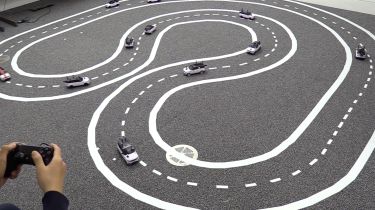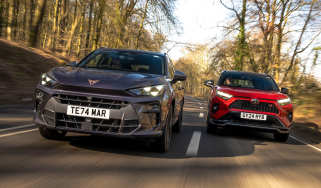Driverless cars will improve traffic flow by at least 35%
A fleet of autonomous cars working together will be able to improve traffic flow by at least 35 per cent, according to researchers

A new study by Researchers from the University of Cambridge has shown that driverless cars will be able to improve traffic flow by at least 35 per cent by working together as a fleet.
The researchers programmed a fleet of miniature robotic cars to drive themselves around a two-lane circuit in order to observe how the traffic flow changed when one car stopped.
• Renault showcases autonomous transport system on university campus
When the cars were not programmed to drive in a cooperative manner, any that came up behind the stationary car had to slow down or stop and wait for a gap in traffic in the other lane. This resulted in a queue forming that decreased overall traffic flow, just like on a real road.
The researchers then programmed the cars to drive cooperatively, so that when one car stopped in its lane, it sent out a signal to all the others. Cars in the other lane responded by slowing down slightly so that those stuck behind the stationary car were able to change lanes quickly, without having to stop or slow down significantly.
In addition, when a remote-controlled car was introduced to the circuit and driven aggressively by one of the researchers, the autonomous cars gave way to each other in order to avoid any crashes.
• Ford and Amazon partner to develop connected and autonomous cars
When the fleet of autonomous cars was programmed to drive cooperatively, overall traffic flow improved by 35 per cent compared with the egocentric driving test and 45 per cent compared with the aggressive driving test.
The results of the study are being presented at the International Conference on Robotics and Automation in Montreal, Canada. It is hoped they will be useful for looking at how driverless cars can communicate both with each other and with human-driven cars on real roads in the future.
Michael He, an undergraduate student at St John’s College, Cambridge, designed the algorithms for the experiment. He said: “Autonomous cars could fix a lot of different problems associated with driving in cities, but there needs to be a way for them to work together.”
• Driverless cars will require one billion lines of code, says JLR
Much of the hardware used in the study was created by Nicholas Hyldmar, a Downing College undergraduate, who added: “If different automotive manufacturers are all developing their own autonomous cars with their own software, those cars all need to communicate with each other effectively.”
Find out more about autnomous cars with our complete guide...
Find a car with the experts



